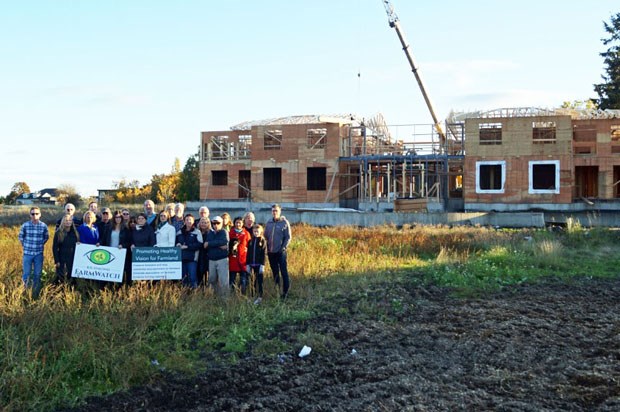The province is catching up to Delta when it comes to thwarting speculators buying up farmland to build mansions.
The Ministry of Agriculture has announced that new regulations have come into effect under Bill 52, introduced last fall, enhancing food security and encouraging farming in the Agricultural Land Reserve.
"I’m very happy to see this law come into full force and effect," said Minister Lana Popham in a statement. "This new law will encourage farming and better protect farmland by banning mega-mansions, stopping the illegal dumping of waste on farmland and reinstating the one-zone system. It’s a great step in our effort to revitalize the Agricultural Land Reserve so that British Columbians can count on a safe, secure supply of locally grown food on their tables for years to come."
The new limits restrict house size to 5,400 square feet.
"The old government let wealthy speculators drive the price of farmland out of reach for young farmers and allowed some of our most valuable agricultural land to be damaged," Popham said last fall.
In 2006, the City of Delta set limits on the size of homes that can be built on farmland.
The maximum farm house floor area for properties less than eight hectares (20 acres) is 3,552 square feet and for properties eight hectares or greater it’s 5,005 square feet. The maximum area for an additional farmhouse is 1,937 square feet on a lot of less than eight hectares, while it’s 2,507 square feet on a lot of eight hectares or greater.
The province's amendments also include increased penalties for dumping construction debris or other fill on farmland. Delta has been ahead of the curve on that issue as well, four years ago enacting regulations for deposit permits, placing the onus on property owners to maintain a log of trucks coming and going.
In 2014, Delta also introduced legislation to regulate soil removal and deposit activities on farmland. The move was made in response to continued concerns about fill, including asphalt and concrete, being dumped on good agricultural land. The legislation is supported through monitoring, by land and air, by Delta staff as well as a Soil Watch program in which area farmers act as Delta's eyes and ears.
On another front, the province’s new amendments also eliminates the two-zone division for the ALR enacted by the previous government. One zone covered the southern region of the province, including Delta, where no changes were made. The other zone covered northern areas where farmers and ranchers were given the green light to add other businesses on their lands to generate additional revenues.
Reunifying the ALR as a single zone ensures consistent rules with strong protections for all provincial ALR land, the ministry explained.
Delta South MLA Ian Paton, the Liberal co-agricultural critic, last fall was critical of the NDP government scrapping the newly created zone in the north, saying the previous government had created it to give landowners more flexibility to live off their land.
"We have a ton of ranchers and farmers up north that are looking at snow for most of the year that are really ticked off about losing Zone 2, which would give them opportunities to do some value-added businesses on their farms. If you’re farming in California or Mexico or Arizona, you’re probably farming 12 months out of the year. But up in Northern B.C., you’re looking at the snow and the rain for seven months out of the year. If you want to keep these guys in farming, you’ve got to give them some opportunities," he said.
Ìý



